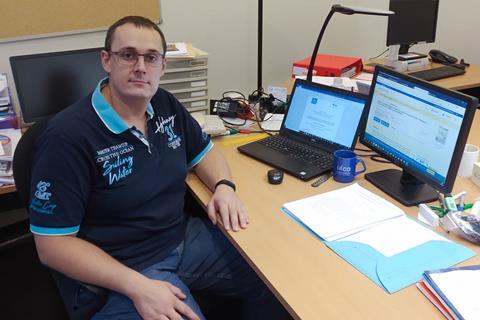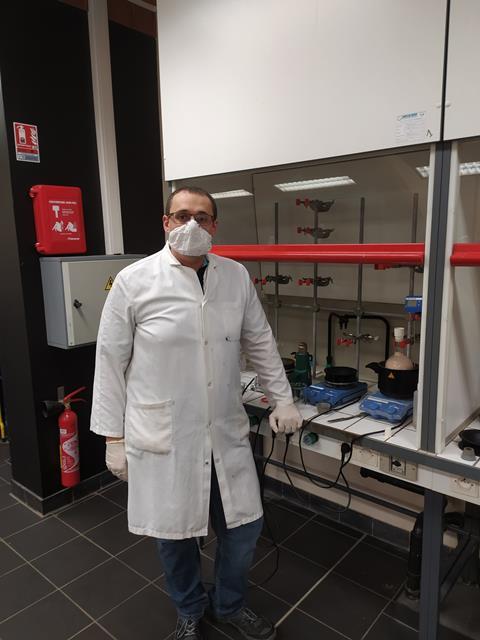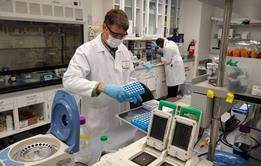A French organic chemist says Covid-19 caused a ‘big blow’ to his research, yet he published insights gained by remote teaching chemistry

During this difficult time, Chemistry World is checking in with notable chemists around the globe to see how they are weathering the coronavirus pandemic.
Chemist Pierre-Edouard Danjou at the Université du Littoral Côte d’Opae in Dunkerque, France, says Covid-19 has halted data production, hampered postdoctoral researcher recruitment efforts, and caused travel difficulties for scientists. A lecturer at the university for over seven years, he pursues research on organic and supramolecular chemistry.
Danjou has three researchers in his group, including one PhD student from Lebanon. France’s higher education minister ordered the nation’s universities closed in mid-March. ‘We had barely a day to stop the experiments, gather our stuff and prepare the next steps,’ he recounts.
Danjou scrambled and was able to obtain computer equipment so that he and his PhD student could continue their work. Confinement officially lasted from 17 March to 11 May, and the labs then reopened for personnel deemed essential.
After the university closed, Danjou says his research ‘took a big blow’. He was carrying out organic synthesis in order to begin a research collaboration with a scientist he met at a conference. Danjou had launched the reactions and was anxiously awaiting the results, which he hoped would provide the proof of concept needed to start the joint work. This research came to a complete stop with the university’s closure and did not resume until early July.
‘The shutdown of the lab was brutal because I had three experiments that ran at room temperature for three-plus months,’ Danjou adds. Luckily, the essential personnel required to maintain the large equipment involved in this research, such as a Nuclear Magnetic Resonance machine, could continue working and come to the lab.
Lebanese PhD student’s story
During the self quarantine period, Danjou communicated with colleagues mostly by email and WhatsApp. Luckily, his PhD student had almost finished her thesis, and was able to make progress on it during confinement. She finished the manuscript in late September and is slated to orally defend it on 9 November, partially by videoconference.
The PhD student, who spends half of the year in France and the other half in Lebanon, has faced extra hurdles. ‘Lebanon is experiencing a major political crisis, coupled with the global health crisis,’ Danjou explains. She was supposed to return home for the summer but couldn’t since it wasn’t clear if she’d be able to return to France to defend her thesis. ‘Luckily, my university was able to help her financially to stay in France,’ Danjou says.
When the university’s research labs reluctantly opened back up following government orders in June, Danjou says, he and his team decided to continue teleworking due to significant new constraints. Only one person was allowed per office, mask-wearing was mandatory, priority lab access was granted to students writing their theses, and there was no place to eat lunch properly.
‘We have to move forward’
Danjou didn’t return to campus until mid-June. ‘I didn’t want to be slowed down or constrained by uncontrolled protocols by physically returning to the lab,’ he recounts.
Beyond research, pre-pandemic he was also teaching and directing a professional Master’s degree programme in analytical chemistry. Covid-19 forced him to immediately transfer his courses online, and remotely manage the administration of the Master’s programme as well as student recruitment. This was especially difficult with his two young children at home and his wife – an elementary school teacher – homeschooling them while providing distance instruction to her students.
Danjou took to setting an alarm clock early in the morning so he could work calmly and without disruption. ‘We have to move forward,’ he says. ‘I have students who count on me, a thesis student who has to defend whatever happens before the end of the year, and children who have to continue to play and discover new things.’
Not yet full speed

The university closed for the month of August as it always does, and Danjou returned on 24 August. Other research groups and students came back between then and the beginning of September. He says many of the restrictions put in place to address Covid-19 are lifted now. There can be more than one person per office and people may eat lunch together.
‘In theory, it is now possible to resume research activity at full speed,’ Danjou says. However, he notes that teaching this new semester, managing students, and organising internships as well as exam retakes from back in March, have kept him busy. He was only able to begin restarting some manipulations in late September.
He was able to publish in a special issue of the Journal of Chemical Education dedicated to insights gained from teaching chemistry remotely during the pandemic. He chose focus on asynchronous instruction.
‘There are great inequalities in the speed of Internet connections and not all students can follow a live course from home,’ due to factors like having younger siblings to look after or sick relatives to care for, Danjou notes. Therefore, he recorded exercises with his smartphone and made the videos available for students on a private Facebook group. These videos were accompanied by synchronous Q&A sessions.
Danjou found that students appreciate this way of working and value the possibility of watching these videos whenever they choose. ‘It helped the slower students not to drop out,’ he says.
As a result, he has requested funding from the university to make more professional videos using a so-called lightboard – essentially a virtual blackboard in front of which the professor teaches and makes presentations remotely. ‘The human side of teaching is appreciated by the students who still think that a teacher is indispensable and cannot be replaced by a video,’ Danjou says.
Chemists amid coronavirus

How chemists around the world are coping with life and work during the Covid-19 pandemic
- 1
- 2
- 3
- 4
- 5
- 6
- 7
- 8
- 9
- 10
- 11
- 12
- 13
- 14
- 15
- 16
- 17
- 18
- 19
- 20
- 21
- 22
- 23
- 24
- 25
- 26
- 27
- 28
- 29
- 30
- 31
- 32
- 33
- 34
- 35
- 36
- 37
 Currently
reading
Currently
reading
Chemists amid coronavirus: Pierre-Edouard Danjou
- 39
- 40



























































































No comments yet